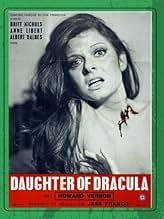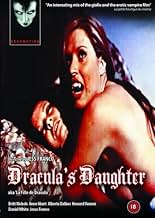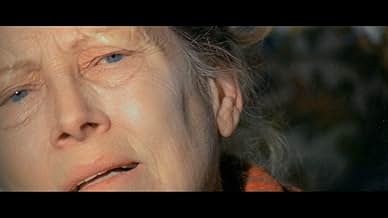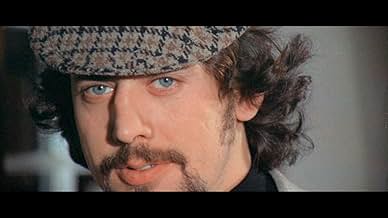IMDb RATING
4.7/10
784
YOUR RATING
Luisa visits her dying mother at Karlstein Castle. Before she dies, she tells Luisa that the Karlsteins are a family of vampires and that her ancestor, the original Count Karlstein, lies bur... Read allLuisa visits her dying mother at Karlstein Castle. Before she dies, she tells Luisa that the Karlsteins are a family of vampires and that her ancestor, the original Count Karlstein, lies buried in the crypt.Luisa visits her dying mother at Karlstein Castle. Before she dies, she tells Luisa that the Karlsteins are a family of vampires and that her ancestor, the original Count Karlstein, lies buried in the crypt.
Carmen Yazalde
- Luisa Karlstein
- (as Britt Nichols)
Alberto Dalbés
- Inspector Ptuschko
- (as Albert Dalbes)
Jesús Franco
- Cyril Jefferson
- (as Jess Franco)
Fernando Bilbao
- Charlie
- (uncredited)
Carmen Carbonell
- Baroness Edith Karlstein
- (uncredited)
Conchita Núñez
- Margot
- (uncredited)
Eduarda Pimenta
- Dorian
- (uncredited)
Yelena Samarina
- Ana Kramer
- (uncredited)
Storyline
Did you know
- TriviaThe name "Dracula" never appears in any of the dialogue, apart from a single instance in the voice-over narration in the opening scene. The vampire patriarch is always referred to as Count Karlstein.
- ConnectionsFollowed by The Erotic Rites of Frankenstein (1973)
Featured review
Personally, I happen to be a great fan of the prolific Spanish Horror/Exploitation deity Jess Franco. The man's impressive repertoire of about 200 film doubtlessly includes masterpieces as well as crap, and everything in-between. Though his very best films ("The Awful Dr. Orlof", "Miss Muerte") range back to the 60s, the early 70s are maybe the most 'typical' period in Franco's oeuvre, as the film he made then were already very sleazy, but still very elegant, and had not yet descended into the cheapness of the majority (but not all) of his 80s offerings. His arguably most famous film, "Vampyros Lesbos" (1971) is from that time, as are other lesbian vampire/erotic Horror gems, such as "Christina, Princesse De L'Erotisme" (1973), or this film, "La Fille de Dracula" (aka. "Dracula's Daughter") of 1972. This is a rather typical example for Erotic Horror by Franco from the early 70s: Supremely elegant, eerie, wonderfully photographed and full of sleaze, lesbianism and gorgeous naked women, very weird, and not exactly focused on a logical plot.
The film begins with a beautiful young woman who strips naked in order to take a bath. She is thereby watched, and later attacked by an unseen, but obviously female vampire... Castle Karlstein: On her deathbed, the old Baroness Karlstein tells a morbid family-secret to her beautifully young daughter Luisa (Britt Nichols)... Soon thereafter, Luisa starts doing lesbian stuff with her cousin Karine (Anne Libert), while more dead bodies pile up around the castle...
The family name 'Karlstein' is obviously a reference to 'Karnstein', the vampire family name in the Sheridan Le Fanu's pioneering lesbian vampire novel "Carmilla" on which countless European Horror productions are based. I'm not sure why they changed the name; the novel is from 1872, so copyright issues couldn't be the reason. Avoiding a close association with the British Hammer Studio's Karnstein trilogy might be the reason; but then, Jess Franco never was afraid to steal names and titles in order to cash in.
The ravishing redhead Britt Nichols is a joy to look at, as are the other female cast members. This wouldn't be a Franco flick if any of the female cast members didn't get naked at some point. There is plenty of lesbianism and sleaze, and the cast includes the best of Franco's typical ensemble cast. Apart from Britt Nichols and Anne Libert, the female cast also includes director Franco's muse and later wife Lina Romay. The male cast includes Franco-regulars Luis Barboo and Alberto Dalbés, and his favorite actor, the great Howard Vernon, who is wasted in a role with hardly any screen time. Franco, who often did cameos in his films, has a bigger role than usual in this film.
Franco's photography and settings are almost always elegant, and in this film in particular. The outdoor scenes were beautifully done in Portugal and Spain, especially the coastal village where most of the film was shot is a wonderful location. The score consists of Franco-typical tunes ranging somewhere between jazzy and eerie. The film has its genuinely gloomy and atmospheric sequences. Sadly, one must say that there are several lengthy periods in-between the atmosphere and sleaze. The film is bizarre, but sometimes also very confused and lacking any logic. Nonetheless, "La Fille de Dracula" is an overall enjoyable and atmospheric wholesome which is especially recommendable for its gorgeous female cast-members. 6.5/10
The film begins with a beautiful young woman who strips naked in order to take a bath. She is thereby watched, and later attacked by an unseen, but obviously female vampire... Castle Karlstein: On her deathbed, the old Baroness Karlstein tells a morbid family-secret to her beautifully young daughter Luisa (Britt Nichols)... Soon thereafter, Luisa starts doing lesbian stuff with her cousin Karine (Anne Libert), while more dead bodies pile up around the castle...
The family name 'Karlstein' is obviously a reference to 'Karnstein', the vampire family name in the Sheridan Le Fanu's pioneering lesbian vampire novel "Carmilla" on which countless European Horror productions are based. I'm not sure why they changed the name; the novel is from 1872, so copyright issues couldn't be the reason. Avoiding a close association with the British Hammer Studio's Karnstein trilogy might be the reason; but then, Jess Franco never was afraid to steal names and titles in order to cash in.
The ravishing redhead Britt Nichols is a joy to look at, as are the other female cast members. This wouldn't be a Franco flick if any of the female cast members didn't get naked at some point. There is plenty of lesbianism and sleaze, and the cast includes the best of Franco's typical ensemble cast. Apart from Britt Nichols and Anne Libert, the female cast also includes director Franco's muse and later wife Lina Romay. The male cast includes Franco-regulars Luis Barboo and Alberto Dalbés, and his favorite actor, the great Howard Vernon, who is wasted in a role with hardly any screen time. Franco, who often did cameos in his films, has a bigger role than usual in this film.
Franco's photography and settings are almost always elegant, and in this film in particular. The outdoor scenes were beautifully done in Portugal and Spain, especially the coastal village where most of the film was shot is a wonderful location. The score consists of Franco-typical tunes ranging somewhere between jazzy and eerie. The film has its genuinely gloomy and atmospheric sequences. Sadly, one must say that there are several lengthy periods in-between the atmosphere and sleaze. The film is bizarre, but sometimes also very confused and lacking any logic. Nonetheless, "La Fille de Dracula" is an overall enjoyable and atmospheric wholesome which is especially recommendable for its gorgeous female cast-members. 6.5/10
- Witchfinder-General-666
- Nov 10, 2010
- Permalink
- How long is Daughter of Dracula?Powered by Alexa
Details
- Release date
- Countries of origin
- Language
- Also known as
- La hija de Drácula
- Filming locations
- Sintra, Lisbon, Portugal(Exterior)
- Production companies
- See more company credits at IMDbPro
- Runtime1 hour 27 minutes
- Sound mix
- Aspect ratio
- 2.35 : 1
Contribute to this page
Suggest an edit or add missing content



























